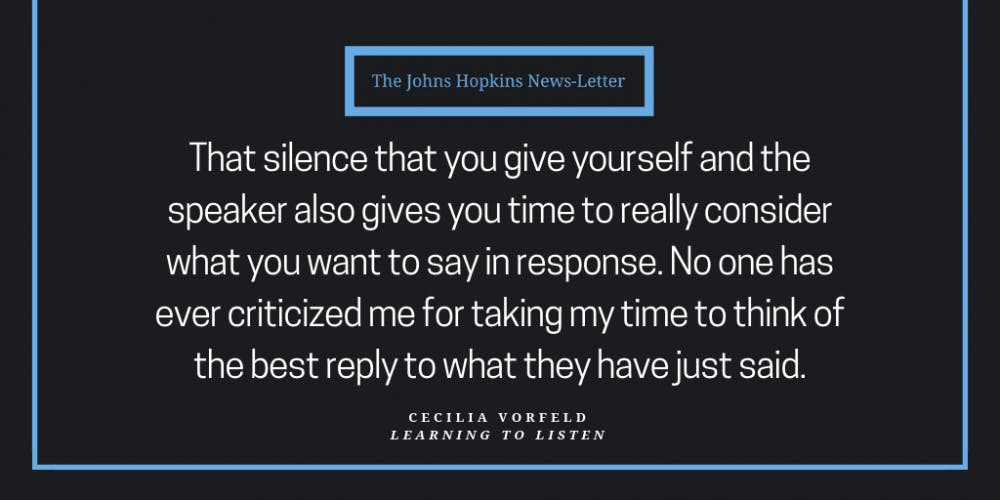
As a member of A Place To Talk (APTT), a peer listening group on campus, I am very lucky to have learnt how to really listen to others in a way that can help someone tackle almost any problem. This doesn’t mean I can fix every situation that I hear about. On the contrary, APTT’s number one rule is that we do not give advice.
Being able to do so takes years of practice, training and education. I have been in the group since my freshman spring, and now as a junior and training again for the second time, I feel like I have learnt many things along the way about how people can help others through focusing on what they are saying.
However, I must say that I am no way near perfect. In the past, I’ve certainly said the wrong thing before to a friend when I’ve wanted to find a solution to their situation and given them advice. Put simply, a lot of the time people don’t want to hear your thoughts or opinions. They came to you to talk about something they’re facing. That’s why I stay so dedicated to the group and love training so much; each time I feel that I improve a little more.
These years of experience have made me reflect on how I and those around me listen to people. We just had our interviews last week, and it is so interesting to see the instincts certain people have when listening to others. Of course no one came to the interview trained in how to be a peer listener. That’s what we’re here for.
Something that has been a huge help to me when it comes to listening to others is silence, which isn’t necessarily an obvious thing. It may sound odd to you, but sometimes silence is the best thing to offer to someone who needs to talk about something. This is not to say that sitting there in silence in and of itself is listening. Not at all. You can actively listen in silence.
When someone is listening to you, they are making eye contact with you, even when the person they are listening to looks away. I remember telling my trainees when I was a trainer that you had to imagine beams of love shooting from your eyes to the other person and trying to show through your eye contact not only that you are listening but also that you care.
Another thing that I love in a good listener is what we call “love on the face.” Someone might be listening to you, leaving space for silence and making eye contact, but if you look up at them and they have a stone cold face with no empathy or sign of care, you may feel disheartened or maybe even judged.
Body language can help a lot with this. Leaning in and having an open body posture, while not invading the other person’s space shows how much you care but also that you respect what they need. I certainly love a good hug and a cuddle when I am feeling down and talking about something difficult, and I love giving hugs. However, I have learnt that not everyone likes physical touch, so the safest option is often to give them some space.
Let’s say that someone has just finished speaking. You’re sitting there with your welcoming and warm body posture, your loving face and your attentive eye contact in silence. This may feel awkward or uncomfortable, so you might feel the need to jump right in. You might be thinking “I’ve got to keep the conversation going!” You really don’t need to though.
Sometimes people need some time to think, to process what they’ve said and to determine what they want to say next. Often you can tell if someone is doing this because they are looking at the ground and something seems to still be on their mind. When they look back up at you, this is usually a sign that they are ready for you to talk again, but I would never rush it. Take your time.
In my personal experience, silence has really helped me open up about things I probably never would have talked about if I hadn’t been given the opportunity to. When I want to talk to someone, it’s because I have something to say, but if it is something more difficult or embarrassing or personal, it can take a while for me to get it out.
I am also a big talker. I just don’t shut up sometimes, so I really appreciate the individuals in my life who aren’t always trying to interrupt me or look at their phone while I vent about something frustrating that has happened to me. Those people are golden and have helped me through some tough times.
I have also found myself listening to someone and sometimes feeling scared that I might say the wrong thing once they stop talking. That silence that you give yourself and the speaker also gives you time to really consider what you want to say in response. No one has ever criticized me for taking my time to think of the best reply to what they have just said.
So the next time you’re listening to someone who needs to talk, just count to three in your head when they’ve stopped talking, keep those golden beams of love shooting from your eyes and do everything you can to let them know that you really are listening.





